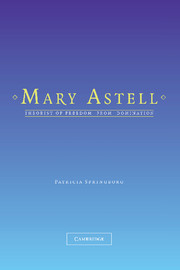Book contents
- Frontmatter
- Contents
- Acknowledgements
- Mary Astell, a Brief Chronology
- Introduction: Astell and Early Modern Feminism
- 1 Mary Astell, Philosopher, Theologian and Polemicist
- 2 Astell, Drake, Education, Epistemology and the Serious Proposal
- 3 Astell on Marriage, Patriarchalism and Contractarianism
- 4 Mary Astell and the Settlement of 1689
- 5 A Fair Way with the Dissenters and Their Patrons
- 6 Astell, Locke and the Highway Man: A Test Case
- 7 Astell, Drake and the Historical Legacy of Freedom
- Appendix: Glossary and Select Biographical Notes
- Notes
- Select Bibliography
- Index
4 - Mary Astell and the Settlement of 1689
Published online by Cambridge University Press: 07 September 2009
- Frontmatter
- Contents
- Acknowledgements
- Mary Astell, a Brief Chronology
- Introduction: Astell and Early Modern Feminism
- 1 Mary Astell, Philosopher, Theologian and Polemicist
- 2 Astell, Drake, Education, Epistemology and the Serious Proposal
- 3 Astell on Marriage, Patriarchalism and Contractarianism
- 4 Mary Astell and the Settlement of 1689
- 5 A Fair Way with the Dissenters and Their Patrons
- 6 Astell, Locke and the Highway Man: A Test Case
- 7 Astell, Drake and the Historical Legacy of Freedom
- Appendix: Glossary and Select Biographical Notes
- Notes
- Select Bibliography
- Index
Summary
Astell's An Impartial Enquiry: The Context
Astell's An Impartial Enquiry into the Causes of Rebellion and Civil War of 1704 is, of all her works, the most polemically partisan, a classic set piece of Tory rhetoric, in which the events of 1649 become a surrogate for discussion of the constitutional provisions of 1689. It was occasioned by the sermon of the Whig bishop White Kennett (1660–1728) preached on 31 January 1703/4 to commemorate the anniversary of the death of Charles I, entitled ‘A Compassionate Enquiry into the Causes of the Civil War’. The very notion of a ‘Compassionate Enquiry’ on such an occasion was offensive to a royalist, and Astell leapt to the defence of ‘the Royal King and Martyr’. Glorification of the royal martyr had long been a calculated Tory strategy, and Tory iconography depicting England's most absolute monarch ‘as a mythological but appealing figure’ dates in fact to the work Eikon Basilike of 1649 – a sentimental and embroidered version of Charles's last reflections, the provenance of which became entangled in Civil War debates. But after 1688 the memory of Charles, and even commemorative sermons, were no longer sacred, and on this occasion, the anniversary of 31 January 1703/4, no less than four prominent Whig divines had preached sermons that damned the royal martyr with faint praise.
- Type
- Chapter
- Information
- Mary AstellTheorist of Freedom from Domination, pp. 143 - 163Publisher: Cambridge University PressPrint publication year: 2005



